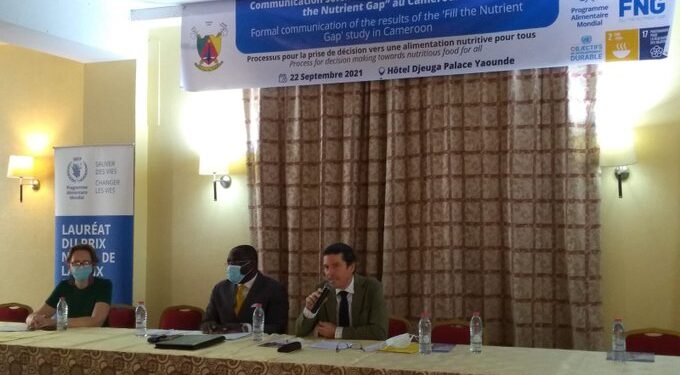A study carried out by a task force established under the Technical Secretariat for the Fight Against Malnutrition in Cameroon, dub ‘Fill the Nutrient Gap’ (FNG), indicates that nearly half of Cameroonians (48%) cannot afford a diet that meets their nutritional requirements, and 24 percent cannot afford a diet that meets their energy needs.
A formal communication on the results of the study was presented in Yaoundé, Wednesday September 22, 2021, with key resolutions aimed at improving the availability and affordability of nutritious diets in Cameroon.
“The presentation of the FNG analysis is a very important step in the process of decision making towards nutritious food for all, as it takes into account the specificities of the food system in Cameroon and intervenes at several sectoral levels.” Says Ihong III, Coordinator of the Technical Secretariat for the Fight Against Malnutrition in Cameroon.
The Nutrition Situation in Cameroon
The main findings of the ‘Fill the Nutrient Gap’ analysis show that for a five (5) person household, a nutritious diet costs FCFA 38,430 per month on average and almost twice as much as the diet that only meets energy needs. Regions with the highest rate of Non Availability in Cameroon are the Far North, North, Adamawa and East regions.
In Cameroon, only 40 percent of children under 6 months are exclusively breastfed per WHO recommendations, and 11 percent of those aged 6-23 months receive a minimal acceptable diet.
The Nutritional needs of adolescent girls, pregnant and lactating women require nutrient-dense foods that are more costly, and that alone accounts for 56 percent of household cost of a nutritious diet.

The findings show that most small scale farms in Cameroon (Majority of the agricultural workforce) with fewer that 2 hectares of land are characterized by low productivity, inefficient production system and very high level of post harvest lost.
These challenges according to experts can be resolved with appropriate measures.
The different stakeholders who worked on the analysis recommended some key points which if applied by the Government would change the narrative in the near future.
Stakeholder Recommendations
To address the triple burden of malnutrition, the Government in the health sector needs to design Nutrition Education Programmes that will promote healthy diets including nutrients-densed fruits, vegetables and animal source foods, promote breastfeeding as the foundation of good Nutrition for Infants and young children and strengthen multiple micronutrients with iron and folic acid supplements for women and adolescent girls.
The fight against malnutrition in the world is no more an issue of the Health Sector alone. To the President of the Cameroon Nutritional Science Society, Prof. CARL M. F. MBOFUNG, the situation calls for intense consideration.
“I will want to emphasis on the fact that the problem of malnutrition is taken very lightly in Cameroon. You hear them talk about the triple burden of the disease, according to the World Bank, Cameroon Government is losing almost 100 Billion FCFA per year in GDP because of deficiencies in vitamins and minerals. In a country like ours which wants to progress, we won’t want to actually lose such amount of money every year. So these considerations, we would need to look into it closely if we want to attain emergence by 2035, because we cannot emerge with malnutrition.” Says Prof. MBOFUNG.
There is need to implement an Integrated National Programme of School Nutrition and Hygiene in all schools.
In the same line, National Nutrition Policy Documents should be aligned with the National Development Strategy (SND30), coupled with the creation of a Nutritionist Corps within the Public Service.
The findings and recommendations according to the coordinator of the Technical Secretariat for the Fight Against Malnutrition, Ihong III, would be forwarded to the Prime Minister’s office.
The analysis was carried out with the technical assistance from the World Food Programme (WFP), in collaboration with the Hellen Keller International Foundation.








